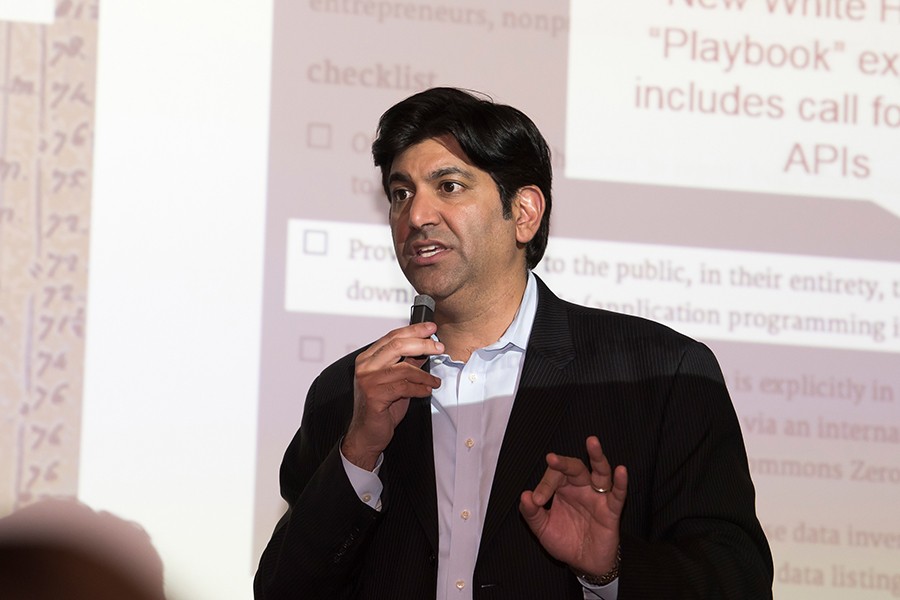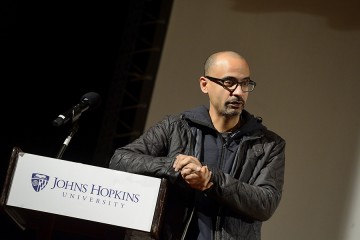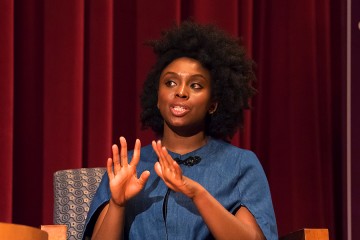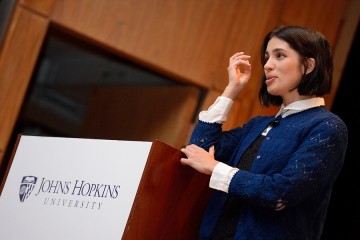It was a typical crowd of students and community members who assembled in Mudd Hall on Wednesday night for a guest speaker, except for a group of about 15 teenagers in suit jackets and ties who sat, quietly fidgeting, in their seats.
They were members of Calvert Hall College High School's Cybersecurity Club and McMullins Scholars program, and they had come in their school uniforms to hear a talk delivered by Aneesh Chopra, the first-ever chief technology officer for the United States.
A 1994 Johns Hopkins University graduate who majored in public health studies, Chopra was appointed as CTO in 2009 by former President Barack Obama. His role aimed to "promote technological innovation to help the country meet its goals from job creation, to reducing health care costs, to protecting the homeland."
He spoke at Johns Hopkins on Wednesday as part of the student-run Foreign Affairs Symposium about the role of government in improving technological innovations and discoveries.
"Raise your hand if you feel hopeful that we're going to solve big problems this decade," he said to the audience.
Few people raised their hands, and even the high-schoolers seemed skeptical. But Chopra wasn't fazed.
"When we're done, I want to leave you with the confidence that we're going to get things done," he said. "I find that we are in the most entrepreneurial period of problem-solving. … Fundamental shifts are happening that are very positive."
Government, he said, has the potential to be a great driver of innovation in the private sector, and vice versa. He called it "government with a little G"—the bureaus and mechanisms of the country that continue to churn, regardless of which presidential administration is steering.
When Procter & Gamble, the American consumer goods company, was having difficulty manufacturing diapers—1,000 a minute—with precision, "government with a little G" stepped in to help. To improve the accuracy of diaper assembly at such a large scale, they borrowed technology from the Department of Energy—specifically, the U.S. nuclear program.
Also see
"It turns out the Department of Energy and the research lab network had built modeling and simulation techniques that, yes, were used in areas as sensitive as nuclear material," Chopra said. "But the technology just as easily applied to diapers."
The inverse of that innovation flow is also true, said Chopra, and private sector companies have the potential to improve government systems as well through what he called a strategy of "handshakes and handoffs."
Handshakes, he explained, are the ideas and changes that come about through political maneuvering by both Republicans and Democrats. Government with a big G.
"Everybody wants to harness the power and potential of the Internet to make our country better," he said.
But handshakes alone cannot fulfill the country's needs. The strategy also requires handoffs, or the willingness to outsource expertise to entrepreneurs who are not necessarily in the public service. Opening up the government's data and systems to the private sector has led to innovations for everyone.
Chopra argued that open government data has sparked innovations such as GPS (sourced from Department of Defense satellites); weather channels and apps (sourced from the National Oceanographic and Atmospheric Administration); and recently, a big data pilot program called Veterans Talent, which partnered with job search websites such as LinkedIn and GlassDoor to create interactive maps of in-demand military skills—sourced from DD214 forms, which are basically military resumes—to help returning vets find employment.
"If we figure out all the talent in our country and around the world, and we find the ideal match for that talent in the job market, we could boost the world's economy by trillions of dollars," he said. "Right now, we're not being put to our highest and best use. But I believe this open data philosophy will help close that gap."
Posted in Voices+Opinion, Politics+Society
Tagged foreign affairs symposium, government











